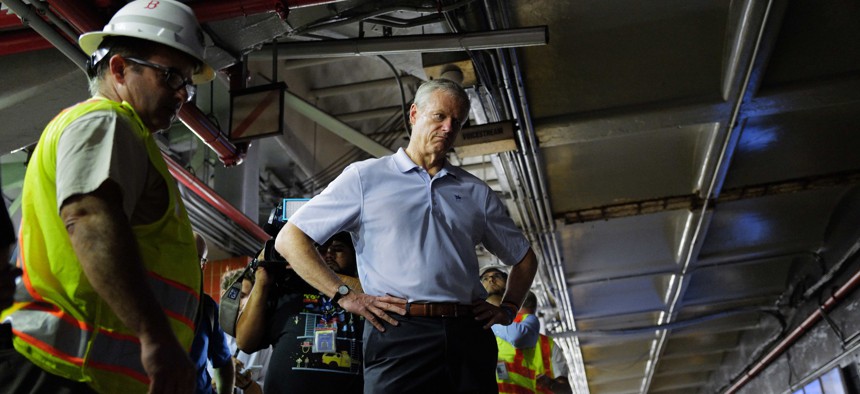Feds Order a Troubled Subway System to Make Immediate Safety improvements

Massachusetts Governor Charlie Baker along with MBTA transportation officials observe completed track work and construction on the Orange Line at the State St. MBTA station in August. Carlin Stiehl for The Boston Globe via Getty Image
The Federal Transit Administration chided the Massachusetts Bay Transportation Authority for systemic safety problems, including dozens of injuries and a passenger’s death.
Transit safety officials from the Biden administration chided the beleaguered Boston-area subway system Wednesday for systemic safety problems, and the federal regulators ordered the Massachusetts Bay Transportation Authority to make dozens of improvements, some of them within a month.
“This is a turning point. It is not a time for recriminations,” said Paul Kincaid, an associate administrator of the Federal Transit Administration, on a call with reporters. “It’s a time to make the team better. It’s a time to improve the safety culture. It’s a time to … create a safer, more reliable ‘T’ for all of Massachusetts.”
The FTA’s report faulted both the MBTA and the state Department of Public Utilities, which oversees the MBTA, for failing to instill a culture of safety at the transit agency.
The Boston subway system has been in crisis for several months. Last year, a train collided and injured 27 people, another train derailed, and a rollaway train injured three rail workers. In April, a train dragged a man whose arm was caught in a door until he died. Later, a subway train caught fire on a bridge outside of Boston in July, forcing passengers to evacuate and one to jump into the river below.
The FTA launched its inquiry into MBTA’s subway operations in April, only the second time it has used its authority to investigate safety problems at individual agencies. (The first was the WMATA system in the Washington, D.C., area starting in 2015.)
In June, the federal regulators made its first round of safety orders for MBTA, citing a “lax safety culture” at the agency. They told the agency to improve staffing its operations center, make repairs to track segments, and improve procedures for moving disabled trains in its rail yards.
In the meantime, MBTA has cut back service on three of its subway lines and shut down one of them for a month.
The report issued Wednesday addresses broader concerns in the way that MBTA operates.
The MBTA, the federal regulators said, has been too focused on building new projects and making upgrades, rather than running its system safely. The focus on capital improvements, they said, allowed the MBTA “to operate a level of service that is not adequately staffed, trained, supervised or maintained.”
Staffing shortages contributed to the problem, and the MBTA didn’t properly review, test or certify new capital projects.
“The combination of overworked staff and aging assets has resulted in the organization being overwhelmed, chronic fatigue for key positions in the agency, lack of resources for training and supervision, and leadership priorities that emphasize meeting capital project demands above passenger operations, preventive maintenance, and even safety,” the FTA wrote in its report.
The federal regulators also criticized the agency for how it handled unsafe conditions and for how it communicated information about safety concerns to frontline workers.
Finally, the FTA faulted the Boston-area agency for how it maintained and followed written procedures. In some cases, the agency had procedures on the books but didn’t follow them. In other cases, the protocols were outdated and didn’t reflect current conditions.
Pandemic-related Challenges
Like many other transit agencies, MBTA has struggled to keep fully staffed in the wake of the pandemic. But Kincaid, the FTA official, said that those vacancies should not stand in the way of MBTA complying with the federal orders.
“We understand there is a staffing need at the MBTA, but our priority is keeping the people who ride these trains safe and keeping the people who work on these trains safe,” he said. “We will not negotiate on whether safety is our priority, and we will not negotiate on whether safety should be the priority of the T and the DPU [the state regulatory agency]. It’s just not an option.”
In response to the report, the MBTA announced it is creating a new office specifically charged with following through with the issues outlined in the report. It said it has started work on half of the 53 actions the FTA ordered in the report. MBTA staff also identified several radio dead spots in the system and has “resolved” most of them.
“The MBTA will begin working on the additional actions immediately and will continue to seek FTA approval as it progresses through the directives,” it said in a press release.
The federal regulators said the DPU, the state agency charged with ensuring that the subway system is safe, “has not been actively engaged in overseeing” the MBTA’s safety improvement efforts, as it is charged with doing.
The FTA does not have direct oversight of the MBTA, so decisions about how the agency will respond will largely fall to Massachusetts officials. But Kincaid said the federal regulators would still be monitoring their progress.
“This is the end of our safety management inspection, but it is not the end of FTA’s involvement,” he said.
Daniel C. Vock is a senior reporter for Route Fifty based in Washington, D.C.
NEXT STORY: Energy Department Seeks Input on $10B Electric Grid Overhaul






